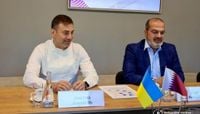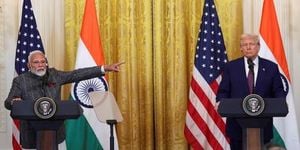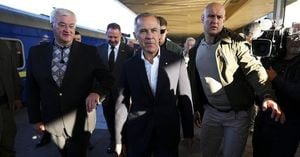On the website of the self-proclaimed Ministry of Education and Science of the so-called Luhansk People’s Republic, a chilling sight greets visitors: photos of smiling children, each accompanied by their age, eye and hair color, a few words about their personality, and a button labeled "Choose for adoption." It sounds like something out of a dystopian film, but this is the stark reality for hundreds of Ukrainian children taken from occupied territories and displayed in a digital "catalogue." Here, users can filter by age, hair color, eye color, or even the preferred form of guardianship—adoption or foster care. Each profile contains photos, gender, and character traits, with labels like "obedient" or "calm." Russian-installed officials claim this state-run system is meant to “improve” adoption rates amid falling domestic demand in Russia. But, as Ukrainian authorities and human rights groups warn, the truth is far darker.
Since Russia’s full-scale invasion of Ukraine began in February 2022, Ukrainian officials have documented the abduction of over 19,500 children by Russian forces. According to reports cited by AP and Ukrinform, these children come from Crimea, Donetsk, and Luhansk—regions occupied since 2014—and have been systematically deported to various parts of Russia, including Moscow. Many are re-registered as “orphans,” issued new Russian documents, and placed with Russian families. Some are enrolled in military schools, while others are sent deep into Russia with fabricated biographies, as if their Ukrainian past had never existed.
But Russia isn’t the only country implicated. According to a 2024 report by the Regional Center for Human Rights, at least 2,219 Ukrainian children have been illegally transferred to Belarus. There, they undergo “re-education” programs that embed pro-Kremlin narratives into the school curriculum from the earliest grades. Teenagers are taught distorted versions of history, with lessons claiming that occupied Ukrainian lands “rightfully belong” to Russia. The aim, say human rights groups, is clear: to erase Ukrainian identity and replace it with Russian allegiance.
Russia, for its part, describes these forced transfers as “evacuations,” “humanitarian aid,” or “rescue” operations. But international law is unequivocal: deportation and forced displacement of children are war crimes. In March 2023, the International Criminal Court issued arrest warrants for Russian President Vladimir Putin and Children’s Rights Commissioner Maria Lvova-Belova over their roles in the mass deportations of children. Despite this, the practice has continued. Ukrainian authorities have identified more than 150 locations in Russia—including around 40 camps, over 40 adoptive families, more than 50 educational institutions, and other state-run facilities—where abducted children are being held.
Human rights organizations describe this as a deliberate state policy of Russification. Children are given Russian passports, pressured to speak Russian, and taught to forget their Ukrainian heritage. The message is unmistakable: their past is to be erased, and their future rewritten. For the children and their families, the trauma is profound and ongoing.
Efforts to reunite families are underway, but progress is painfully slow. Only a small fraction of the abducted children have been returned to Ukraine. Each successful return is a complex operation, often involving months of negotiation, clandestine missions, and the cooperation of international partners. The odds can seem insurmountable. Yet, stories of resilience and hope do emerge.
One such story unfolded on August 24, 2025, Ukraine’s Independence Day. Verkhovna Rada Commissioner for Human Rights Dmytro Lubinets reported, via Ukrinform, that 83 Ukrainian children had been returned from temporarily occupied territories and from Russia thanks to the mediation of Qatar. Just a day earlier, three more children and one young adult had been brought home with Qatar’s support. Since the beginning of the full-scale invasion, within the framework of the presidential initiative Bring Kids Back UA, a total of 1,564 children have been returned to Ukraine.
Several groups of returned children have participated in recreation and psychological rehabilitation programs in Doha, the capital of Qatar, to restore their health after deportation. For Ukraine, Lubinets stressed, this aspect is crucial. "Today was a special meeting — with us were children who were returned thanks to Qatar’s mediation: they sincerely shared their stories and dreams, and exchanged symbolic gifts. This is what we work for," Lubinets said, highlighting the emotional weight of each successful reunion.
On August 24, Commissioner Lubinets met with the Ambassador of Qatar to Ukraine, Hadi Nasser Al-Hajri, to discuss further steps in protecting children’s rights and providing humanitarian support. The Commissioner thanked both Qatar and Ambassador Al-Hajri for their consistent and unwavering support for Ukraine, noting that, while some countries have ceased their participation in the process, Qatar remains an example of true humanity and responsible international leadership.
"Thanks to Qatar’s mediation, 83 children have already been brought back from the temporarily occupied territories of Ukraine and from Russia," Lubinets emphasized. He recalled that only yesterday, three more children and one young adult returned to Ukraine. The ambassador and the ombudsman also discussed ongoing cooperation and the urgent need to continue these humanitarian efforts.
Despite these successes, the scale of the challenge remains daunting. The online database in Luhansk lists 294 children under the control of Russian-installed authorities, but this is only a fraction of the true number. Ukrainian authorities estimate that more than 19,500 children have been abducted since the invasion began. The fate of many remains unknown, their identities erased, their futures uncertain.
Meanwhile, Ukrainian officials have identified more than 150 locations in Russia where abducted children are being held. These include camps, adoptive families, educational institutions, and other state facilities. The children are often given new Russian passports, pressured to speak Russian, and subjected to programs designed to erase their Ukrainian identity. According to human rights groups, this is a deliberate policy of Russification—a systematic attempt to erase the past and rewrite the future for an entire generation.
International condemnation has been swift and unequivocal. The International Criminal Court’s arrest warrants for Putin and Lvova-Belova send a clear message: the forced deportation and Russification of Ukrainian children will not go unpunished. Yet, as Lubinets and his team know all too well, legal action alone cannot undo the trauma or reunite families. That work continues, day by day, child by child.
As Ukraine marks 34 years of independence, the struggle to bring its children home remains a defining battle in the country’s ongoing war for its future. Each child returned is a small victory—a testament to the resilience of families, the persistence of officials, and the power of international cooperation. But for every child brought home, many more remain lost in the shadows of occupation and war, waiting for their own chance to come back.




